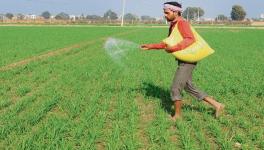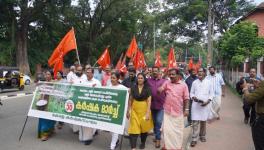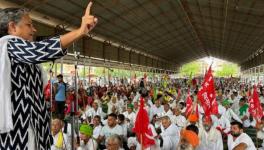Maharashtra Farmers Set Off on Long March Again, to ‘Fight Till Last Drop of Blood’
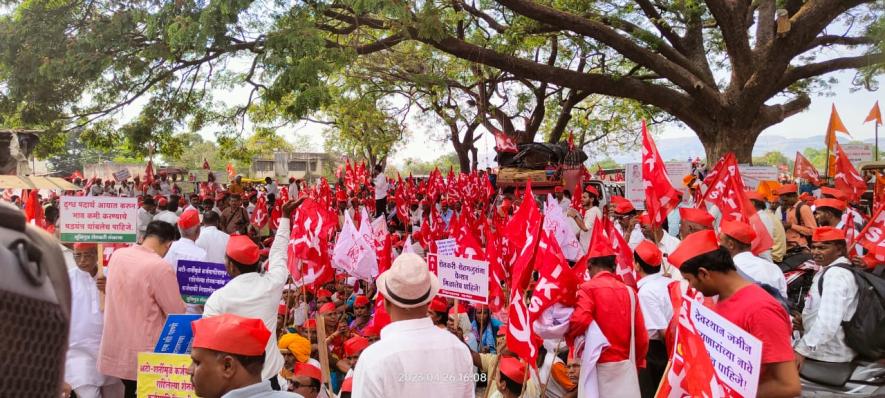
After waiting for 38 days, Maharashtra farmers are set to resume their ‘Long March’ under the banner of the All India Kisan Sabha’s (AIKS) in Ahmednagar on Wednesday to demand the implementation of the agreement with the state government.
The farmers have demanded an end to “police persecution” of people in Dhanivri, Palghar district, whose houses were demolished for constructing the Mumbai-Vadodara Expressway without adequate compensation and were subsequently arrested. The farmers also want the two people who protested the construction of an oil refinery in Ratnagiri district to be released.
The farmers have alleged that the state government broke its promise that the police would not harass people for land acquisition and that an amicable decision would be reached. They have also demanded the transfer of land titles of temple trusts to tenants. Maharashtra has 6 lakh acres acquired under the Hyderabad Atiyat Inquiries Act, 1952. Other demands include fair and remunerative prices for milk, soybean, sugarcane and cotton farmers.
AIKS president Ashok Dhawale told Newsclick that the farmers were “compelled to resume the march because the state government has not responded to their demand for compensation for crops damaged by untimely rains and hailstorms”.
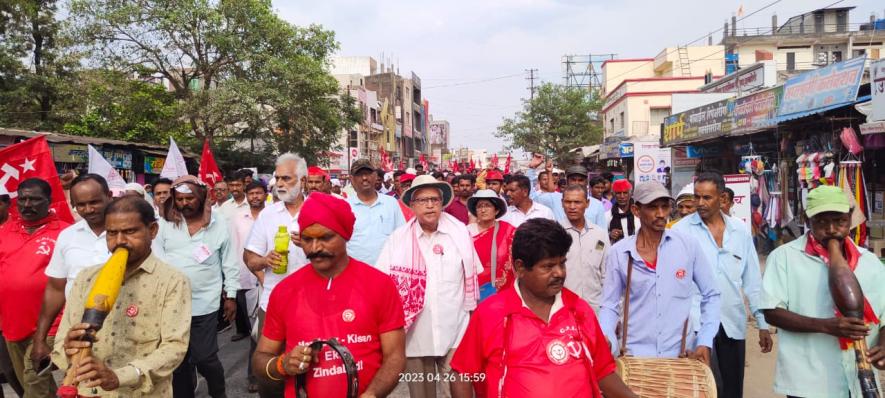
“The police have not stopped their brutal ways in dealing with protesters who have lost their livelihood. In the last two years, excessive and unseasonal rains destroyed crops in Maharashtra. The state government announced compensation for farmers but never provided it,” he said.
“Repeated assurances were given to vest forest, temple, Inaam, Waqf and pasture land for housing to peasants and agricultural workers, many of whom are tilling such lands for several generations. However, the police and forest department were misused to beat up poor peasants and drive them out of their land and houses,” Dhawale alleged.
Deepak Lipan, a cotton farmer based in Parbhani district, Marathwada, said that milk farmers had been “cheated on the pretext of fat volume by cooperative diaries and corporate milk producers”.
“If the cost of producing a litre of milk is Rs 25, we only get Rs 20. The same milk is sold at higher prices in cities. If a company is earning big profits, why cannot farmers get a fair return?” asks Lipan, all set to participate in the march.
“The prices of inputs like fodder and medicines for animals are increasing. However, milk prices are either stagnant or dropping. It’s complete loot. That’s why thousands of farmers have decided to march to Loni to make revenue minister Radhakrishna Vikhe Patil listen to our demands,” he added.
Citing his example, Lipan said, “While prices of inputs like seeds, fertilisers, herbicides and labour have increased, cotton prices are stagnant. I sold cotton at Rs 7,000 per quintal in 2012 whereas one DAP fertiliser bag cost Rs 500. Today, cotton is sold at the same rate but DAP fertiliser costs Rs 1,700.”
His four acres yielded 30 quintals of cotton that was sold for Rs 2,10,000. “I spent about a lakh on labour, seeds, diesel, etc. What did I get? If I calculate the labour put in by me, my wife, mother and two children, it’s a complete loss. The children lose out on studies as well.”
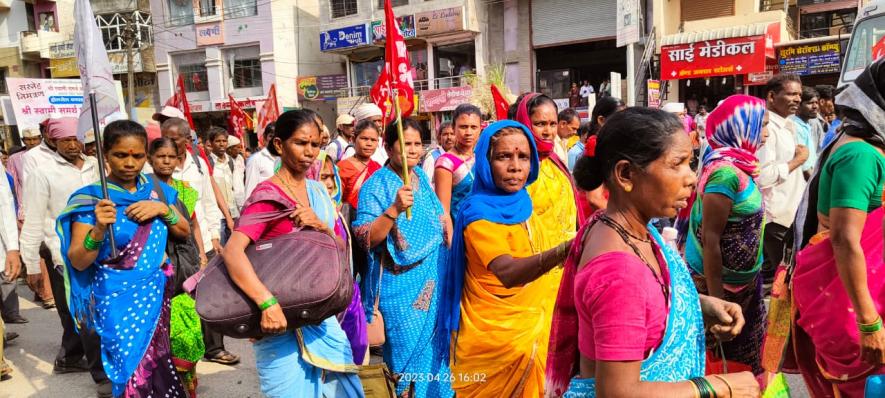
When asked about the state government’s cold response to farmers’ problems, Lipan said that only a struggle, not silence, would give results. “Farmers got a Rs 350 subsidy on onions after we fought for months. Therefore, we shall fight till the last drop of blood.”
Another farmer, Bhagwan Bhojane, told Newsclick that sugarcane farmers have been waiting for their payments even after five months of the crushing season. “Sugar mills never let the prices of sugarcane increase. The average price is Rs 2,300-Rs 2,600. However, the input costs are always higher and there is no protection against crop damage,” he said.
“I grew sugarcane on five acres. It is impossible to run my household on agriculture alone. My brothers work in MGNREGA and other construction sites to run their households,” he added.
Professor R Ramkumar, School of Development Studies, Tata Institute of Social Sciences (Mumbai), who would participate in the march, said that “economics cannot be seen in isolation from ground realities. “Having theoretical understanding is certainly a very important part of academics but you cannot have a nuanced view of agriculture and problems of agrarian society if you miss farmers’ movements like this,” he told Newsclick.
“Extreme weather conditions, including untimely rains and price crashes, have badly hit farmers. The problem of extreme weather conditions could have been easily dealt with if the Centre and state governments had designed a comprehensive insurance scheme. Private companies aiming to get maximum premium and pay minimum compensation run such schemes,” Ramkumar rued.
He added that the El Niño phenomenon has resulted in both excess rains and droughts. “A good insurance scheme could have resolved the issues if all factors were calculated. Unfortunately, crop insurance programmes have excluded crores of farmers. For example, Pradhan Mantri Fasal Bima Yojana beneficiaries have consistently decreased. The fact that the government compensated farmers after their protest in Maharashtra is an admission of failure,” he said.
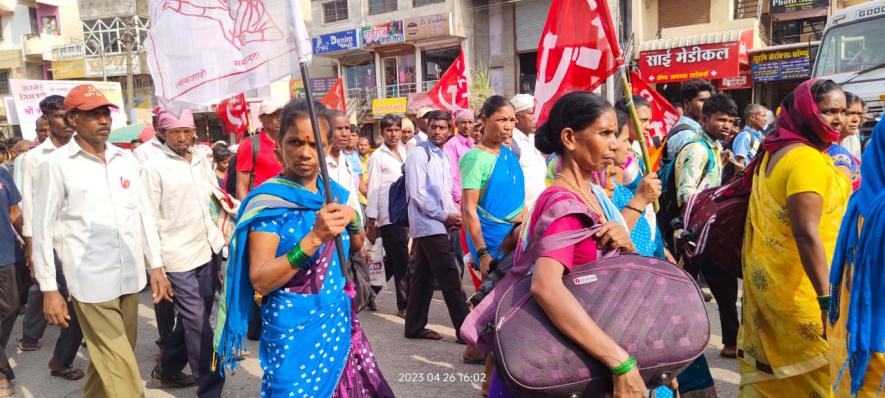
Cash crops are linked with international markets and can fall within days. “In this situation, the government should have ideally restricted imports and provided MSP. Secondly, input costs, like diesel, electricity, seeds and fertilisers, have increased whereas crop prices are largely stagnant. So, their farmers’ incomes have been squeezed,” Raamkumar explained.
Giving the example of milk farmers, Ramakumar said that milk prices crashed from Rs 35 per litre to Rs 17 per litre during the pandemic. “Farmers have been asking the government to ask large private diaries to increase the procurement prices or provide some help. But the government has failed on both fronts. Moreover, the milk sector is being corporatised with large companies taking over procurement, marketing and sales of milk products. So, farmers are not getting prices that they deserve.”
Ramakumar maintained that the demand to distribute six lakh acres among landless farmers for housing and agriculture is politically feasible. “Land reforms not only mean distribution of vast tracts of land from big landlords to peasants but also Bhoodan and Devasthan land, amounting to lakhs of hectares. However, the government is under pressure from landlords and corporate entities. Companies are eying this precious land for agro-industries for cheaper rates.”
Get the latest reports & analysis with people's perspective on Protests, movements & deep analytical videos, discussions of the current affairs in your Telegram app. Subscribe to NewsClick's Telegram channel & get Real-Time updates on stories, as they get published on our website.










